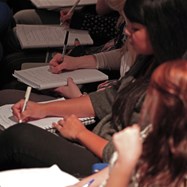Sutton Trust report "Knowing Where to Study?"
14 February 2008
Director General of The Russell Group, Dr Wendy Piatt, said:
“The Russell Group welcomes the fact that the survey recognises that attainment is the most important indicator of whether a student is willing to travel to attend university. As the report states, “students with high grades are unlikely to choose to live at home regardless of their family income”. This supports the robust body of evidence (which is not explored in any depth in the report) that shows that ‘academic achievement’ is overwhelmingly the most important factor in the likelihood of a student going to university. Raising attainment of students from lower socio-economic backgrounds is therefore essential in improving access to higher education.
“The jury is out on how far bursaries and other financial considerations play a role in the decision-making of prospective students, but it is interesting that the survey finds that large bursaries have a much greater impact than smaller bursaries. A student from a low income background attending a Russell Group university received guaranteed bursarial support of £1,680 on average. This is over six times the minimum bursary of £300 required by OFFA. Some universities provide up to £4,000 per year. Guaranteed support is supplemented by a large number of schemes targeted at high achieving students or more specific under-represented groups. Eligible students can expect Russell Group university support of some £3,400 per year on average (11 times the OFFA minimum), and up to £5,000.
“The Russell Group is also working hard with schools and other agencies in order to provide more accessible and transparent information on the wealth of bursaries and scholarships available. We very much welcome the report’s emphasis on the importance of the improving the information, advice and guidance available to pupils particularly about the real costs and benefits of taking a degree.
“The report helpfully points to the importance of university open days and to the ways in which current university students can impact on the decision-making. Russell Group universities currently employ well over 100 (full-time equivalent) widening participation staff and encourages thousands of student volunteers to work in schools. Much of this resource is devoted to inspiring and informing pupils – from young children to mature learners – about higher education, encouraging those at school to continue their studies post-16 and facilitating their entry to a course at our universities. Often Russell Group universities do not directly benefit from these activities as many pupils who receive this help apply elsewhere but we recognise our role in helping all students fulfil their potential.”
-
Hamir Patel
hamir.patel@russellgroup.ac.uk
020 3816 1316
-
Hollie Chandler
Hollie.Chandler@russellgroup.ac.uk
020 3816 1307
 X
X

